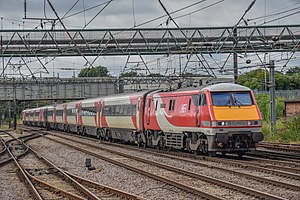British train
InterCity 225 Specifications Configuration: • UIC Bo′Bo′+2′2′+...+2′2′+2′2′ Length 245.23 m (804 ft 7 in)
Performance figures Maximum speed 125 mph (201 km/h) Power output 6,300 horsepower (4.7 MW)
Career Operators Disposition In service
Project Mallard refurbished First Class carriage The InterCity 225 is an electric push-pull high speed train in the United Kingdom , comprising a Class 91 electric locomotive , nine Mark 4 coaches and a Driving Van Trailer (DVT). The Class 91 locomotives were built by British Rail Engineering Limited 's Crewe Works as a spin-off from the Advanced Passenger Train project,[ 3] [ 4] Metro-Cammell in Birmingham and Breda (under sub-contract) in Italy , again borrowing heavily from the Advanced Passenger Train. The trains were designed to operate at up to 140 mph (225 km/h) in regular service, but are limited to 125 mph (200 km/h) principally due to a lack of cab signalling and the limitations of the current overhead line equipment . They were introduced into service between 1989 and 1991 for intercity services on the East Coast Main Line (ECML) from London King's Cross to Leeds , York and Edinburgh .
^ thejunction.org.uk, rolling stock: class 91 , Retrieved on 04-07-2007 ^ "Oliver Keating, The Inter-city 225 , Retrieved on 04-07-2007" . Archived from the original on 17 June 2008. Retrieved 4 July 2007 .^ "The Design and Development of the Class 91 Locomotive", P J Donnison and G R West, Main Line Railway Electrification Conference 1989 - Proceedings of the Institute of Electrical Engineers, 1989.
^ "The design, manufacture and assembly of the British Rail Class 91, 25 kV 225 km/h locomotive", M L Broom and G W Smart, Proceedings of the Institute of Mechanical Engineers Vol. 205, 1990.

